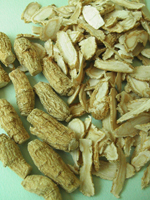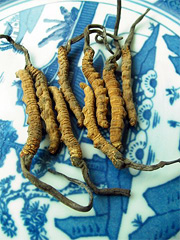Home Care Advice for Dysfunctional Uterine Bleeding (DUB)
For women with dysfunctional uterine bleeding, bed rest is recommended if the bleeding is heavy. Moreover, regular sleep schedule, avoiding physical strain and copying with stress can ensure a smooth recovery. Medications should be taken under the instructions of doctors, as they may worse the bleeding condition. Individuals should keep a menstrual diary, that tracks the pads or tampons used, length of periods and any accompanying symptoms, so as to help monitor the progress. If the bleeding gets worse or becomes severe enough to cause dizziness or weakness, contact the doctor immediate.
A healthy eating plan is important for smooth menstrual cycles, in TCM terms, it promotes the spleen and stomach to work more efficiently, so that the body has sufficient blood and qi (vital energy) to support menstruation. It also helps prevent further development of pathogens like heat and blood stasis. Food and drinks that are raw, frozen, not easily digested or heavily spicy can affect the blood condition and should be limited, especially before and during menstruation. The daily meals should be light, contain plenty of fruits and vegetables, and proper amount of protein rich foods. TCM believes that foods just like herbs that can possess specific functions to tonify, cleanse and regulate the body; certain foods are beneficial for women who have menstrual disturbances and are recommended to add in the meals.
In addition, a prolonged bleeding causes individuals to have low levels of blood and qi, leading to dizziness, blurred vision, paleness, fatigue, palpitations and insomnia. Beneficial ingredients for these are Chinese yam, lotus seed, red dates, poria, longan aril, mulberry, meats, fishes and donkey-hide gelatin. It is also a tradition for TCM physicians to prescribe a special diet along with routine treatment to promote healing or prevent recurrence. Below are simple recipes for dysfunctional uterine bleeding.
 |
Donkey-hide gelatin congee: donkey-hide gelatin (30g, pounded), glutinous rice (60g) and rock sugar. Boil the glutinous rice and 1500ml water with a pot, bring to a boil and then simmer until it turns into a thick soup. Add in the gelatin, stir evenly to make it melts in the soup, turn off the heat and add rock sugar to taste. Serve warm, eat in the morning and evening. This helps replenish qi and blood. |
 |
Pilose asiabell root congee: pilose asiabell root (15g), and rice (50g). Boil the asiabell root with water to make a solution first, then pour the solution, rice and 1500ml water in a pot, bring to a boil and then simmer until it turns into a thick soup. Turn off the heat and add rock sugar to taste. Serve warm, eat in the morning and evening. This helps replenish qi and promote digestion and absorption. |
 |
Hyacinth bean and red date tea: hyacinth bean (30g) and red dates (10 pieces), boil with 500ml water for 20 minutes, add sugar to taste. This helps invigorate the spleen and replenish qi. |
 |
Hawthorn tea: fresh hawthorn fruit (10 pieces, pounded), boil with 800ml water for 20 minutes. Add brown sugar to taste, drink regularly. This helps activate blood and resolve stasis. |
 |
Fresh juice makes with lotus root and Chinese radish, which help clear heat and cool blood. |
 |
Herbal chicken soup: notoginseng (5g, pounded) and chicken meat (200g). Cut the chicken in pieces, marinate the meat with notoginseng powder, ginger, soy sauce, sugar and millet wine, put in a double-steam container, and add in 250ml water. Steam for one hour and serve hot. Drink the soup and eat the meat. This helps stop bleeding, resolve stasis, and replenish qi and blood. |
 |
Herbal turtle soup: caterpillar fungus (3g), lotus rhizome node (50g) and Chinese soft-shelled turtle (one about 200g). Chop the turtle, remove the outer membrane and wash, blanch in boiling water and drain, then marinate with salt, sesame oil, soy sauce, and ginger. Put the turtle meat in a pot with 2000ml water, bring to a boil quickly, discard the floating foam, add in the herbal ingredients, and cook on a low heat for about 1-2 hours. Season to taste. Serve hot, drink the soup and eat the meat. This helps nourish yin, invigorate the kidneys, cool blood and arrest bleeding. |
 |
Herbal pigeon soup: American ginseng (3g), astragalus root (15g) and baby pigeon (one). Wash the pigeon, sprinkle inside out with salt, millet wine and ginger evenly, stuff the pigeon with the herbs and tie legs together. Put in a double-steam container, and add in 250ml water. Steam under high heat for one hour. Serve hot, drink the soup and eat the meat. This helps invigorate the spleen and replenish qi. |
 |
Mussel and pork soup: Dried mussels (50g), lean pork meat (100g, minced), green onion and ginger. Clean and soak the mussels in water for 20 minutes, marinate the meat with salt, sesame oil, ginger, rice wine and pepper for 20 minutes. Add a little vegetable oil in a pot and heat up, put in the ginger, green onion, mussels and meat, stir slightly, then fill in 800ml water, bring to a boil and further cook in low heat for about 30 minutes. Serve hot. This helps clear heat, nourish yin and blood, and arrest bleeding. |
 |
Herbal pork kidney stew: pork kidney (2 pieces), eucommia bark (30g) walnut (30g) and ginger (15g). Cut the kidneys in half and devein, slice and marinate with salt, sesame oil, soy sauce, ginger, rice wine and sugar for 20 minutes. Add some vegetable oil in a pot and heat up, put in the kidneys and stir-fry for a while, then fill with water to about 1cm from the top, bring to a boil and add in the other ingredients, cook in low heat for about one hour. Serve hot. This helps nourish the liver and kidneys, and replenish essence. |
 |
|
 |
|
 |
| American ginseng |
|
caterpillar fungus |
|
pilose asiabell root |
|